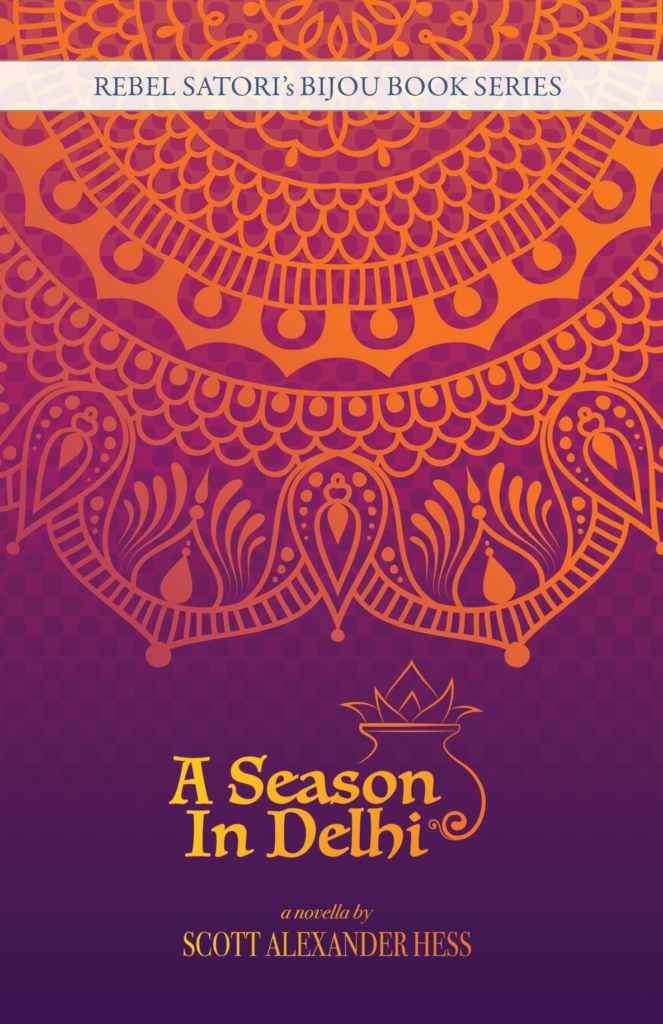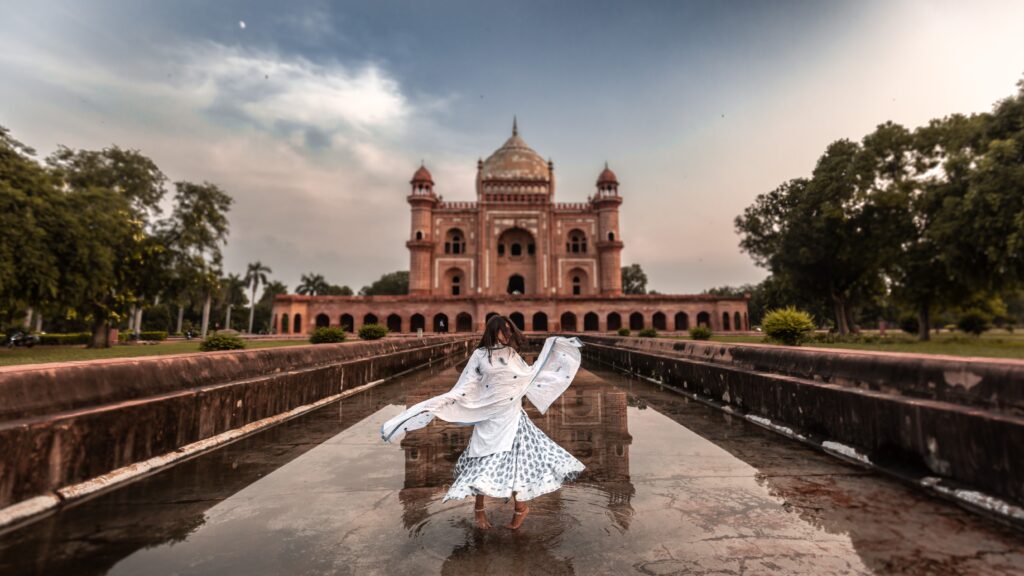New queer novel captures the mystery, romance and danger of expats in Delhi
Inspired by the works of Paul Bowles (The Sheltering Sky) and Lawrence Osborne (The Forgiven), A Season in Delhi follows a recently-married couple, Brant and Lloyd, as their idyllic Indian journey takes a dark turn when a secret infidelity is revealed.
A heartbroken Lloyd leaves Brant behind in despair, but the discovery of a journal written by a scandalized diplomat’s wife in Delhi of the 1950s creates a parallel storyline that transcends time and cultures, providing a revelation that may save the doomed couple.
The two storylines twine around each other, providing a look into clashing cultures, poverty and privilege in an intriguing, evocative and page-turning tale that fills the senses.
Scott Alexander Hess is a New York-based award-winning novelist who is known for his evocative, character-driven works that focus on gay relationships, often in a historical fiction setting. He curates Hot Lit, an LGBTQ+-themed monthly newsletter, and teaches fiction writing at Gotham Writers Workshop. He was also recently a finalist for the upcoming TV show America’s Next Great Author.
After writing the Lambda Literary Award Finalist Skyscraper, the Kirkus Reviews “Best Book of 2015” The Butcher’s Sons, and his recent novella collection The Root of Everything & Lightning (a #1 Amazon Bestseller), Hess’s newest project is A Season in Delhi (Rebel Satori Press) is out on November 12.
We caught up with the novelist to find out more about the inspiration for the book.
Queer Forty: What launched you on the path to becoming a novelist?
Scott Alexander Hess: I actually wrote my first “novel” at age 9. It was called the Witch’s Wall (I devoured all things horror in grade school) and my amazing mother (who was a voracious reader and writer herself) typed it up for me. I asked that she type it on small “novel sized” pages, but she said the larger page worked fine. Fast forward to college, I spent time as a journalist, wrote a screenplay and a few short stories, before settling into my first prose-form love – the novel, during my MFA at New York City’s The New School. My thesis was my first novel.
I was delighted by A Season in Delhi! It evokes Paul Bowles’ work of course but I also found myself thinking of Somerset Maugham and 1940s noir films and literature. What was the impetus for the book for you — was it rooted in genre or theme or both?
Scott Alexander Hess: I am a huge fan of Bowles, Maugham, Graham Greene, Lawrence Osborne and other writers who mix ‘exotic’ locations with psychological turmoil, conflicted, flawed characters and a dash of intrigue or danger as well as clashing cultures.
I also really love emerging myself in another time and/or place in my fiction. My two trips to Delhi with my husband in 2019 and 2020 were incredible and I knew I had to write something about an American experiencing the energy, culture history and spiritual power that exisits there. I also decided in the novel to parallel the experience of a woman living in Delhi in 1950 as my visits brought up a lot of thought-provoking ideas around gender and identity.


Generally, where do you draw your inspiration from?
Scott Alexander Hess: I do believe in muses. I think my subconscious never sleeps, and ideas come to me unexpectedly and without warning. I jot everything down, and if an idea or story continues to speak to me, to wake me, to summon new visuals I know it’s time to give it time on the page. I often have a few books happening at once, the one that is being published, the one I am revising and the newest one I am writing.
I also read constantly, and love film. All story telling teaches me and I am most drawn to daring, sometimes experimental or unorthodox choices made by writers. I love being surprised, baffled, moved, evoked.
When you have an idea, how do you know it might be a novel or novella — as opposed to another medium?
Scott Alexander Hess: I am pretty much solidly living in the world of the fiction writer (novels and novellas). It’s my space to create. I never really know the length and there are many books where I have no idea where the story is really headed. So, length (novel, novella) often emerges along the way and I trust the story to guide me.
As a gay person, what seems to you to be the most compelling themes of our time or to you, personally?
Scott Alexander Hess: As a young queer writer, I wanted to write literary fiction that was also erotic, sensual and poetic. Growing up, I struggled to find inspiration and most “gay” novels were hidden near the adult magazines and had covers featuring shirtless handy men. Later in life, when I discovered brilliant gay writers like Jean Genet, Alan Hollinghurst, and others I realized my LGBTQIA fiction could be both highly literate and highly sensual.
Regarding the current dangerous oppression of our LGBTQIA community, it’s terrible and terrifying and also heart-breaking.
I found A Season in Delhi to be very evocative and it also rang true for me, having been to India and specifically the region you describe. I had similar sensorial and visual responses to it. But as a white person writing about a ‘foreign’ locale, how do you approach the question of cultural appropriation or ‘exoticism’ in an author’s use of setting and characterization? It seems very limited to me to only write directly about what you ‘know’ because so much of art is about what we don’t know!
Scott Alexander Hess: I’ve faced this question in a number of cases with my fiction. In my novel The Butcher’s Sons, set in New York City, 1930, I wanted a section set in Ireland which I had visited and to include an Irish relative’s point of view. Similarly in this book set in Delhi, while the narrative is limited to the point of view of the visiting American and what he experiences, I wondered about giving the Hem Raj character a more evocative voice. But in both cases, I knew for me this was not possible. I could not create an authentic voice of someone in a culture I had not lived in or for whom that culture was not something I had fully lived.
This isn’t to say that we can’t write things beyond our reach. My novella Lightning is about a young man in 1918 who loves horses and is faced with the possibility of being a jockey. His desires and dreams were anchored in feeling, something I could connect to and recreate, and my research talking to jockeys, visiting horse farms etc., gave me what I needed to honestly represent his story.
Fun task: A Season in Delhi is so cinematic. If you had dream casting and dream director a la The Sheltering Sky…who might you cast?
Scott Alexander Hess: I would love to see A Season in Delhi on the screen!!!!! I think the director Francis Lee who blew me away with his film God’s Own Country would be amazing. I’d love to cast as the couple a pairing of Luke Evans, Ben Whishaw, and/or Noah Galvin. I have to say I also (in my mind ) saw Tom Hardy as the big hearty Lloyd and I’m a big fan of Casey Affleck ever since Manchester by the Sea. His access to vulnerability is amazing.
Get A Season in Delhi here.






